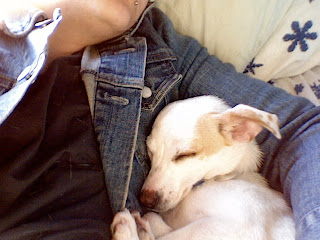i thought i had everything lined up , new dog tag with a way to find home if lost, friend to drive and a cage in the back so no stress on me or the lil guy.
I was putting Jupiter the friendly corgie/terror in the cage and he managed to get out of his collar and took off running down the street ! he was very fast and traffic was faster, i tried but could not get close to him , But then his foster mom saw what was happening and called him and she brought him back !
have you ever tried "self induced CPR"
the Lil guy slept all the way back home, he checked out the yard and came inside and adopted the couch in the other living room. he was very quiet and shy all night long so let him be where he was with water and food if needed.
By the end of day 2 i decided to find a way to feed him ;-D so i "hot rodded" his crunchies with some salt free/no fat beef broth. yep one tablespoon and "poof" bowel empty and Jupiter back on his couch .
well i got his attention and tried a walk with the leash... WOW he is great! no puling, just nice well behaved and walks along my side. They said to watch out for cats, well we walked by a few, he looked and then ignored !
he still has this "6 ft comfort zone" but now he will follow me around the house and wonder where i am at. He learns quick and now will follow me to the bedroom and sleep in his bed.
perfect little gentleman on a walk. i live in a senior community and all the ladies are saying how cute he is and well behaved !
so now being a senior citizen i finally found a cute doggie can also be "date bait" hehehe
He is still a bit nervous so no fresh pictures, but the whole experience has been great !
i had a rescued doggie before but i will say that Hopalong was totally honest and no surprises with him ! Maybe we will go to my Vet next week if he feels comfortable with it? I want to start him on Heartworm pills ASAP !
NOTE to all.... back in the 70's i lost a basset hound to heart worm and not a nice thing ! now they have a pill that will prevent it, so get them on the pill !!!
with him being so fast and quiet i found it is safest to use the laundry room door as a "sally port".
when i enter and leave my house. and when i come back he is waiting at the door, sees me and then does his 6 ft comfort zone with his tail wagging.
I haven't been back to the bay area since 1986, but this trip was worth it !!
Ya Jupiter will fit right in here and i want to thank Hopalong for their good, no GREAT work !
Dennis




-722540.JPG)
























